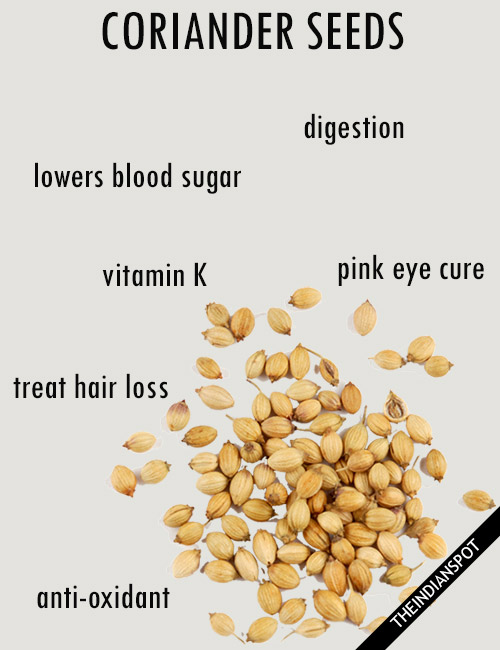Coriander is an integral part of Indian cuisine. We regularly use coriander seeds as a spice, and coriander leaves for garnishing curries, salads, or soups. Coriander is a small, hollow-stemmed plant in the Apiaceae family, in the genus: Coriandum. Pleasant, aromatic and spicy, its seeds have been found utility since ancient times in cooking as well as in various traditional medicines. The seeds of coriander, a commonly-grown garden plant, have a variety of possible health benefits, and here I have listed some of them:
 RICH IN MINERALS
RICH IN MINERALS
Coriander seeds are rich in copper, magnesium, iron, potassium, manganese, and zinc. These essential minerals help in increasing red blood cell count, improving metabolism, regulating growth, enhancing sperm generation, synthesizing nucleic acids, keeping blood pressure in check, and keeping diabetes in control.
ANTI-INFLAMMATORY
Cineole, one of the 11 components of the essential oils, and linoleic acid, are both present in coriander seeds, and they possess antirheumatic and antiarthritic properties. They help to reduce the swelling that is caused by these two conditions.
ANTI-DIABETIC
Coriander seeds help lower blood glucose, thus maintaining healthy blood sugar levels. It reduces the amount of LDL (bad cholesterol) and increases the amount of HDL (good cholesterol) in the blood. Those suffering from diabetes and high cholesterol should drink coriander seed water daily.
ESSENTIAL VOLATILE OILS AND FATTY ACIDS
Some important fatty acids in coriander seeds include petroselinic acid, linoleic acid (omega 6), oleic acid, and palmitic acid. In addition, the seeds contain essential oils such as linalool (68%), a-pinene (10%), geraniol, camphene, trephine etc. Together; these active principles are responsible for digestive, carminative, and anti-flatulent properties of the seeds.
DIARRHOEA REMEDY
Some of the components of essential oils found in coriander such as Borneol and Linalool, aid in digestion and proper functioning of the liver, while also helping to reduce diarrhoea. It is also helpful in curing diarrhoea caused by microbial and fungal action, since components like Cineole, Borneol, Limonene, Alpha-pinene & beta-phelandrene have antibacterial effects.
VITAMIN C AND B
Unlike other dry spice seeds that lack in vitamin C, coriander seeds contain an ample amount of this anti-oxidant vitamin. 100 g of dry seeds provide 21 mg or 35% of RDI of vitamin-C. Furthermore, the seeds are the storehouse of many vital B-complex vitamins like thiamine, riboflavin, and niacin.
ADDITIONAL BENEFITS:
- Anaemia results from iron deficiency and negatively impacts the efficiency of oxygen transport by blood. Coriander seeds help compensate the iron deficit.
- Coriander seeds possess many plant-derived chemical compounds that known to have been anti-oxidant, disease preventing, and health promoting properties.
- Coriander seeds are also rich in vitamin K. Vitamin K in it is good for the treatment of Alzheimer’s disease.
- Coriander seeds is cooling It can be used internally to ward off allergic reactions such as anaphylaxis, hives, swelling and intense itching. Externally, it can be applied as a paste to affected areas.
- Considered one of the best remedies for conjunctivitis (pink eye), coriander also prevents other eye diseases and problems.
- If you suffer from heavy menstrual flow, then include coriander seeds in your regular diet. They also help prevent menstrual irregularities.
- Hair loss can result from weakened hair follicles, hormonal imbalances, stress, as well as improper diet. Coriander seeds prevent further hair fall and help stimulate the roots for the growth of new hair.